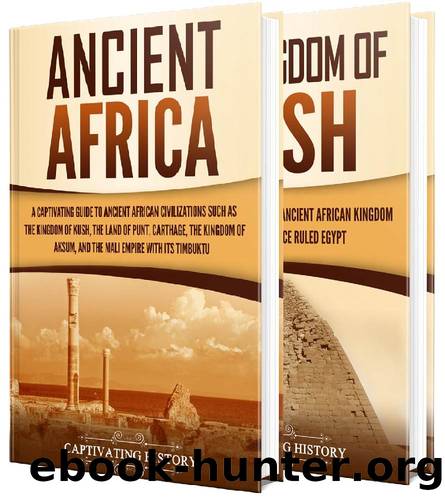Ancient African Kingdoms: A Captivating Guide to Civilizations of Ancient Africa Such as the Land of Punt, Carthage, the Kingdom of Aksum, the Mali Empire, and the Kingdom of Kush by Captivating History

Author:Captivating History [History, Captivating]
Language: eng
Format: azw3
Published: 2020-09-18T00:00:00+00:00
Conclusion
There are many gaps in our knowledge about ancient Africa and the kingdoms that ruled over the continent. This lack of evidence slows down our ability to learn what happened in the past. The ever-shifting sands of the Sahara Desert, as well as the probable climate changes that occurred on the continent, have hidden archaeological sites that are yet to be discovered. In the case of the mystical Land of Punt, we donât even know its exact location. However, the birthplace of humanity is a rich playground for scholars and historians, who work tirelessly to come to new conclusions and find new evidence that will part the veils that still obscure history.
Many monuments, texts, and images of the bygone days of Africa remain to be discovered, but what we already have is enough to understand the way of thinking and life of these ancient kingdoms. Egypt, a civilization that left behind so much evidence, granted us an insight into the life of other ancient lands of Africa. Through the prism of Egypt, we can learn about Nubia, Kush, and Punt. Carthage also left a rich culture behind, which still fascinates us with its stories and its connections with the rest of the world, and thanks to several ancient Roman, Greek, and Phoenician historians, we have a clear view of Carthaginian heritage.
Other kingdoms, such as Aksum, Ghana, and Mali, have rich oral traditions that can inspire our imagination. Unfortunately, the stories passed from generation to generation can rarely be confirmed with historical evidence. They remain just that, stories to be told at evening bonfires by the Berber peoples of Africa.
Luckily, the entrance of the Middle Ages brought about the Islamization of the continent. With it, many geographers, historians, and explorers of the Arab world showed interest in the African continent. They gathered witnesses who told them about the distant cities and kingdoms, such as Ghanaâs Koumbi Saleh and Maliâs Timbuktu. They talked about the riches, about the trade routes of the Sahara Desert, of the kings and queens sitting on their ebony thrones. If not for the scholars of Islam, the history of West Africa would still be unknown to us today.
However, itâs not only the lack of evidence that can be blamed for our poor knowledge of Africaâs history. As the birthplace of the human race, Africa must be understood so we can better understand ourselves. Unfortunately, the archaeology of colonial times believed that the societies of ancient Africa were not capable of producing anything interesting, and at the beginning, archaeologists ignored Africa completely (except for Egypt and Carthage). Thus, excessive research on the history of this continent is just starting. And as the oldest settlement of humanity, Africa is very diverse, culturally rich, and abundant with historical information. There is so much left to discover about the first humans, their development, the first villages, cities, and kingdoms of ancient Africa. In time, more information will be discovered, as we have barely scratched the surface of the rich history of the African continent.
Download
This site does not store any files on its server. We only index and link to content provided by other sites. Please contact the content providers to delete copyright contents if any and email us, we'll remove relevant links or contents immediately.
| Africa | Americas |
| Arctic & Antarctica | Asia |
| Australia & Oceania | Europe |
| Middle East | Russia |
| United States | World |
| Ancient Civilizations | Military |
| Historical Study & Educational Resources |
The Daily Stoic by Holiday Ryan & Hanselman Stephen(2708)
The Fate of Rome: Climate, Disease, and the End of an Empire (The Princeton History of the Ancient World) by Kyle Harper(2436)
People of the Earth: An Introduction to World Prehistory by Dr. Brian Fagan & Nadia Durrani(2346)
Ancient Worlds by Michael Scott(2102)
Babylon's Ark by Lawrence Anthony(2070)
Foreign Devils on the Silk Road: The Search for the Lost Treasures of Central Asia by Peter Hopkirk(2055)
India's Ancient Past by R.S. Sharma(1986)
MOSES THE EGYPTIAN by Jan Assmann(1971)
The Complete Dead Sea Scrolls in English (7th Edition) (Penguin Classics) by Geza Vermes(1840)
Lost Technologies of Ancient Egypt by Christopher Dunn(1797)
The Daily Stoic by Ryan Holiday & Stephen Hanselman(1768)
The Earth Chronicles Handbook by Zecharia Sitchin(1744)
24 Hours in Ancient Rome by Philip Matyszak(1676)
Alexander the Great by Philip Freeman(1645)
Aztec by Gary Jennings(1544)
The Nine Waves of Creation by Carl Johan Calleman(1519)
Curse Tablets and Binding Spells from the Ancient World by Gager John G.;(1510)
Before Atlantis by Frank Joseph(1483)
Earthmare: The Lost Book of Wars by Cergat(1466)
